-
The Importance of Balancing Your Pool Water
If you want to keep your swimming pool in top shape, you will need to keep up with pool maintenance near Salt Lake City. This involves skimming debris from your pool, maintaining your filter, and balancing the chemicals in your water. Watch this video clip for a brief look at the importance of balancing your pool water.
A swimming pool offers a refreshing escape from the heat, but a pool that is lacking in maintenance might not be so refreshing after all. A swimming pool with balanced chemicals, on the other hand, will feel more comfortable and offer greater cosmetic appeal than one that has been neglected. Your swimming pool specialist can take a look at elements like the pH level of your water, the hardness of your calcium, and the total alkalinity of the system. If you want to keep your pool comfortable and attractive, keep your water balanced.
-
Remodeling Your Swimming Pool
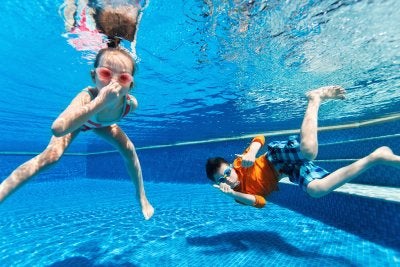 If your first swimming pool installation serving Salt Lake City did not meet your expectations, consider having a different swimming pool company handle your remodel. A swimming pool remodel can leave you with the pool you always wanted; it can even be a different shape. You might also change the decking or coping for a new sense of aesthetic appeal, or you might add a water feature to boost the entertainment value. Continue reading to learn about the different aspects of remodeling your swimming pool.
If your first swimming pool installation serving Salt Lake City did not meet your expectations, consider having a different swimming pool company handle your remodel. A swimming pool remodel can leave you with the pool you always wanted; it can even be a different shape. You might also change the decking or coping for a new sense of aesthetic appeal, or you might add a water feature to boost the entertainment value. Continue reading to learn about the different aspects of remodeling your swimming pool.Changing the Shape
You might decide to remodel your swimming pool for practical or aesthetic reasons, and there are many aspects that you can renovate. Although it may be a little more extensive than other procedures, some homeowners decide to adjust the shape of their pool. A different shape can allow your pool to fit your yard better, or it can change the way you use your pool. A large, round pool can be great for relaxing or playing pool games with your friends and family, while a straight and narrow pool might be ideal for swimming laps. Make sure your new pool shape and design fit your swimming needs.
Adjusting the Design
From your decking to the hue of the pool water itself, there are many design elements to consider when remodeling your swimming pool. A decking or coping remodel can keep your pool looking seamless within the context of your yard, improving the aesthetic appeal of the whole space. If your pool is still in excellent condition, you might consider a remodel because you have changed the environment around it. After adding an outdoor fireplace or kitchen, consider sharing elements between these features and your pool area for a holistic atmosphere.
Adding a Water Feature
When it comes to pool design, water features can help you seal the cosmetic deal. A fountain that shoots water up from the middle of your pool or an outdoor waterfall that gently trickles into a basin can make a massive difference for your property. These types of remodels will be sure to restore your appreciation for your swimming pool.
-
Fun Features for Your Swimming Pool
A swimming pool installation will provide you and your loved ones with fantastic opportunities to enjoy the outdoors and have fun in the sun. As you are working with a pool contractor to plan your pool or hot tub installation, you may want to consider adding a water feature or other element that will transform your ordinary pool into an extraordinary oasis. From pool slides to water fountains and more, your pool contractor in Salt Lake City can help you incorporate wonderful features into your swimming pool design. To help you get started on your pool installation, here is a look at some fun features to consider for your swimming pool design.
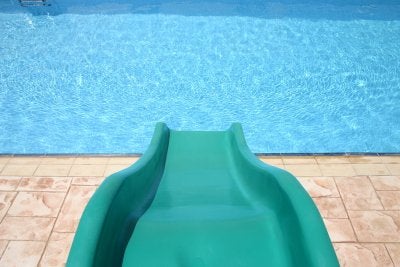
Waterfalls
Waterfalls can be a stunning addition to any swimming pool design. When you incorporate a waterfall into your swimming pool plans, you will create a natural focal point for your swimming pool design. Depending on the design of your waterfall, this pool feature can also serve as a recreation area. As you are designing a waterfall for your swimming pool, you may want to include foliage and other features that have a tropical feel.
Fountains
A fountain is another stunning addition to any pool design. With a beautiful fountain installation, you will provide your pool with classic elegance and flair. Today’s pool fountains range from classical to contemporary in design. When you are planning your new swimming pool fountain, you can ask your contractor to help you create a custom fountain that matches perfectly with the style of your home.
Vanishing Edge
When you are seeking a show-stopping addition to your swimming pool design, you may want to incorporate a vanishing edge. With a vanishing edge swimming pool, your new pool will have the appearance that it stretches all the way to the horizon. Vanishing edges can also be used to highlight a stunning view from your property. With the help of your swimming pool contractor, you can create beautiful pool that is filled with unique features.
-
What Is your pool’s pH?
Swimming pool pH provides you with a snapshot of the quality of your swimming pool water. If your swimming pool water is too acidic or basic, your pool will not be comfortable for swimming. For example, pool water that is too acidic may be cloudy or cause eye and skin irritation. For help caring for your swimming pool installation, it is a great idea to work with a quality swimming pool contractor in Salt Lake City. A pool company offering swimming pool maintenance will be able to help you balance the chemistry in your conventional or saltwater pool. For more information about swimming pool pH, be sure to watch this video clip.
-
Swimming Pool Water Testing Guide
After your pool installation, it is extremely important to keep up with routine swimming pool maintenance and care. One of the most important steps of pool maintenance is checking your pool water at least twice each week. When you test your pool water, you will get an idea of whether your pool chemicals are balanced, and also whether your pool water will be inviting for swimmers. To test your pool water quickly and easily, it is smart to keep a swimming pool test kit on hand. A swimming pool test kit will check every aspect of your water quality, including pH, total alkalinity, calcium hardness, and free chlorine or bromine. In the event that you find that your swimming pool water is continually out of balance, it is a great idea to contact a company offering swimming pool services in Salt Lake City. With professional swimming pool maintenance, you will be able to keep your pool in fantastic condition throughout the years and seasons.
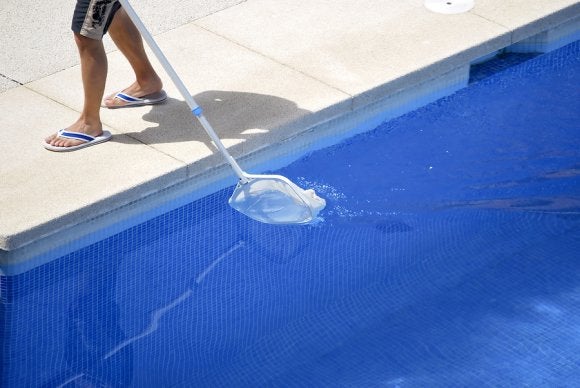
-
Choosing a Great Swimming Pool Layout
When you are preparing for a swimming pool installation, it is important to create a pool design that matches perfectly with the style and layout of your home and yard. From traditional L-shaped pools to pools with organic, curved designs, your pool contractor in Salt Lake City can help you create the perfect pool for your property. To get the most out of your swimming pool or hot tub installation, it is crucial to work with swimming pool builders who have a great reputation in the local community. Read on for some handy tips to keep in mind when you are choosing a swimming pool layout.
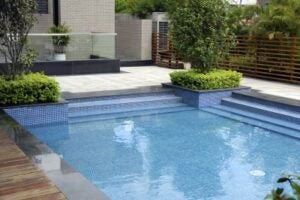
Rectangular Layout
If your yard has a formal look and feel, you may want to choose a rectangular layout for your swimming pool. The rectangle is a classic swimming pool layout that has been used for many centuries. For those pool owners who like to swim laps or perform water aerobics, the rectangular swimming pool is also the perfect shape for getting aquatic exercise.
Oval Layout
To place a unique twist on your swimming pool design, you may want to consider choosing an oval layout. Unlike a rectangular swimming pool, which contains angular edges, an oval swimming pool is rounded on the ends. With an oval swimming pool, you and your loved ones will be able to set up water games around the perimeter of the pool. The softer lines of an oval swimming pool will make this type of pool appear less formal in your yard.
L-Shaped Layout
When you are seeking to maximize your pool deck space, you might want to consider creating a swimming pool that has an L-shaped layout. With an L-shaped swimming pool, your pool will create a natural lounging area that you and your guests can use to enjoy the sunshine. Since an L-shaped pool has a natural contour, you can also create shallow and deep areas that are suited for different swimming activities and games.
-
A Look at Gunite Pools
Gunite pools are popular choices for homeowners and business owners who are looking to have beautiful, long-lasting pools installed on their properties. Gunite is a pool installation application process where concrete is sprayed over a rebar frame using compressed air. A dry mixture of cement and sand is pushed through a specialized hose. Water is added to hydrate the dry mixture at the nozzle of the hose just before the entire mixture is applied to a new pool’s metal framework. This process makes gunite in-ground pools very durable. And since these pools can be designed and built on site, they can be made in any shape, size, and depth—the possibilities are limited to your property’s lot size, your budget, and your imagination.
When you’re ready to design and build your new gunite pool, hire an experienced pool contractor in Salt Lake City who specializes in more than just pool installation. A good swimming pool company should offer other services such as a pool maintenance program, spa and hot tub installation, and poolside design and construction.

-
What Shape of Swimming Pool Is Right for You?
One of the first things you have to consider when you’re planning a swimming pool installation is the style of your new pool. With so many different shapes of pools to pick from, the task of choosing the right one may seem daunting. Luckily, it doesn’t have to be. Your design aesthetic, property’s size, and budget are all important factors in determining the right shape of swimming pool. When in doubt, enlist the help of a reputable pool contractor in Salt Lake City . In the meantime, here are a few common pool shapes you should know about before scheduling a pool installation.
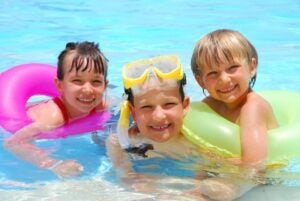
Oval Pools
The shape of an oval pool can be very visually appealing, especially if there are a lot of square edges in your swimming pool area. There are two popular variants to this shape: kidney and figure eight.
Freeform Pools
A freeform pool has no definite or established shape. Design-wise, you can make it look like whatever you wish. Freeform pools can be completely amorphous or fluid, or they can resemble various objects. These pools are a good choice for a homeowner who favors an eccentric or organic design scheme.
Rectangular and Lap Pools
Rectangular pools are popular because of their basic no-frills style. A lap pool is a type of rectangular pool that is used in competitive swimming. These pools are perfect for swimmers who mainly swim for exercise or who are training for competition. Though rectangular pools can be built to fit any size space, they are best in area that are narrow or that are limited in space.
Geometric Pools
Geometric pools have defined shapes that tend to be square in nature. This style of pool can have a modular look to it, which makes it perfect in a contemporary design, and can either be symmetrical or asymmetrical.
Grecian and Roman Pools
Grecian and Roman pools have a recognizably classic look to them—they are rectangular pools with highly stylized, trimmed-off corners. They tend to be large pools that can accommodate a lot of people in them at once.
-
Winterizing Your Pool
How to Winterize a Pool
After an exciting summer season of swimming and lounging, pool owners who live in an area where winter temperatures drop below freezing must winterize their pools to protect them during the offseason. Proper winterization is an essential step every pool owner must follow. However, it can be complex and difficult, especially for new pool owners. Our easy-to-understand and thorough guide will provide you with all the information you need to winterize your pool correctly. Whether this is your first season or you’ve been winterizing your pool for years and need a refresher, we’re here to help.
What Is Pool Winterization?
Pool winterization is the process of preparing your swimming pool for the sub-zero winter months. When water freezes, it expands, damaging your pool lining, plumbing, and equipment. By balancing water chemistry, cleaning the pool, lowering the water levels, and protecting the plumbing and equipment, you can prevent costly repairs while keeping the water as clean and clear as possible for opening weekend.
What Are the Benefits of Pool Winterization?
Taking the time to winterize your pool is essential for getting the most from your home’s pool. Winterization offers several significant benefits, including:
- Prevents Equipment Damage – When water freezes, it expands, causing your plumbing and equipment to crack. Draining the water is the most effective way to avoid damage.
- Protects the Pool Structure – Your vinyl lining can dry out and crack over the winter. If you have a fiberglass or concrete pool, it prevents cracks caused by ice pressure.
- Keeps Water Clean – Winterizing your pool prevents algae growth, meaning you’ll spend less time cleaning it once pool season begins.
- Saves Time and Money – Winterizing your pool saves you from expensive repairs and extensive cleaning costs when summer returns. A quick and easy spring opening is a direct result of a thorough fall closing.
What Do I Need to Winterize My Pool?
Preparing all your winterization equipment before you get started will ensure a smooth process. Here’s the basic equipment you’ll need for closing your pool:
- Pool Water Test Kit
- Winterizing Chemicals
- Pool Cover
- Pool Brush and Skimmer Net
- Pool Vacuum
- Air Compressor or Shop Vacuum
- Winterizing Plugs
- Pool Antifreeze
What Are the Steps for Pool Winterization?
Now that you have all the winterizing items, you can close your pool like a pro. Follow these steps to ensure your pool is correctly winterized:
- Clean Your Pool Thoroughly – Use your skimmer to remove all surface-level debris like leaves and sticks. Next, use a brush to scrub dirt stuck to the walls and floor. Finally, use your pool vacuum to remove as much dirt from the bottom of the pool as possible.
- Test and Balance the Water – Use your test kit to check the water chemistry. Adjust the pH (7.2-7.6), alkalinity (80-120ppm), and calcium hardness (180-220 ppm) levels to fall within the recommended ranges. Once balanced, add a dose of pool shock and allow it to circulate through the pool for several hours.
- Add Winterization Chemicals – Add a winter algaecide and a stain and scale prevention product. These chemicals will work through the winter to prevent algae growth and mineral buildup on your pool’s surfaces. Allow the pump to run for a few hours to distribute these chemicals evenly.
- Lower the Water Level – Next, lower the water levels below your pool’s plumbing. To lower the water level, turn off the pump and set the valve to “waste” or “drain” setting.
- Drain and Store Equipment – Drain all water from your pump, filter, heater, and chlorinator. Store the equipment in a warm, dry area such as a basement or garage if possible.
- Clear the Plumbing Lines – Though you’ve lowered the water levels, water can still be trapped in the plumbing. Use a shop vacuum or air compressor to clear the lines and plug them up to keep them dry throughout the offseason.
- Cover the Pool – You’ll want to install your pool cover. A secure pool cover will prevent debris and dirt from entering your pool so that it can be easily opened.
Prepare Your Pool for the Winter Season
If you live in an area where the temperature drops below freezing, winterization is essential for protecting your pool. If you’re still unsure about pool winterization, then contact Deep Blue Pool and Spas. As your local pool services expert, our knowledgeable and experienced team of certified pool professionals provides complete pool closing and winterization services in Salt Lake City, UT. We can ensure your pool is winterized and protected throughout the off-season. Schedule your service today.
-
Beautifying Your Swimming Pool Area
There are several ways to beautify your swimming pool area —some more involved than others. For example, a few well-placed plants can improve the visual appeal of your swimming pool. You can choose to do several small beautification projects gradually or to complete one grand project after your pool installation. Here are some suggestions to take into consideration. When you’re ready to turn your pool area into an oasis, be sure to hire a full-service swimming pool company near Salt Lake City to do the job for you. An experienced pool contractor can help you with the designing, planning, and implementing processes.
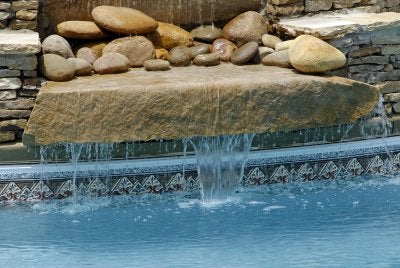
Adding a Water Feature
Water features of any kind can make a space relaxing and tranquil. The sound of moving water from a stream or a fountain is undeniably soothing. The sight of a cascading waterfall can be awe-inspiring. Whether it’s beside your pool or it’s a part of it, a water feature is sure to elevate your outdoor space.
Putting in a Hot Tub or Spa
If you’re planning a swimming pool installed on your property, consider putting in a complimentary hot tub or spa. Nothing quite beats the sensation of soaking in a hot tub after a nice swim in a cool pool. A well-designed pool and spa combo can be visually stunning.
Using Rocks and Boulders
If you want to have a more natural-looking pool area, you should use rocks and boulders. These accent pieces can be made of actual rock or manufactured material. Natural stones can really be attractive when placed around your pool, but they can be costly to purchase and install—especially larger boulders. Artificial stones are much lighter and can be made to look like natural stones. Larger structures, such as rock waterfalls, can be fabricated in whatever shapes you desire at reasonable costs.
Creating a Sanctuary with Plants
One of the best ways to beautify your pool area is to add landscaping. Plants are pivotal in creating an oasis-like space, and they work well with natural elements like rocks and boulders. Not only can plants make an area look lovely, but they can also be used to create privacy. Tall shrubs or fanning palms can block the view from a nosy neighbor or a passerby on the sidewalk.
RECENT POSTS
categories
- Uncategorized
- Hot Tub Installation
- Swimming Pool Installations
- Swimming Pool Design
- In Ground Pools
- Swimming Pool Maintenance
- Swimming Pool Service
- Swimming Pool Repair
- Outdoor Fireplace
- Outdoor Fire Pit
- Pool Safety
- Deep Blue Pools and Spas
- Exercise
- Swimming
- Outdoor Kitchen
- Pool Chemicals
- Chlorine Levels
- Water Feature
- Burning Calories
- Pool Contractor
